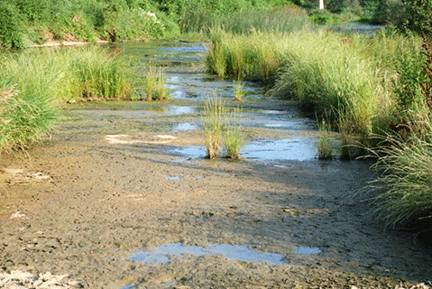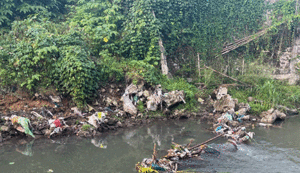All 58 California counties, including Contra Costa County, are under a drought emergency and summer has barely begun, with its dry, hot weather. Understandably, the idea of below-average rain gauges and reservoirs may sound like fewer water sources to produce mosquitoes, but the fact is, drought years can increase the risk of mosquito-borne illnesses including West Nile virus.
While mosquitoes develop from egg to adult in water, they must swim to the surface of the water to access air. When the creeks, streams, and rivers have enough water to flow, even though there is more water, there can be fewer places where mosquitoes can successfully mature to adulthood because the rushing water prevents them from reaching the surface of the water to breathe. When water is still, however, mosquitoes can thrive.
During drought conditions, the risk of West Nile virus can increase because:
- As water flow in creeks and streams decreases, pockets, and puddles containing standing water can appear providing mosquitoes a place to develop from egg to adult. And in the summer’s heat, the smaller amount of water in puddles can warm more quickly, actually allowing mosquitoes to develop faster.
- Other wildlife, including birds, will look for water and will be attracted to the available puddles.
- As West Nile virus is a disease carried by birds, particularly those in the Corvid (crow) family, infected birds may be attracted to the same puddles that are producing mosquitoes
- Newly emerged adult female mosquitoes can bite an infected bird and become infected.
- The newly infected adult female mosquito can transmit West Nile virus to another animal or human through a single mosquito bite.
What can Contra Costa County residents do to reduce the risk of mosquitoes and West Nile virus during a drought?
- Dump out any amount of water in your yard. Even the amount that can fill a bottle cap can produce mosquitoes.
- If you’ve saved rainwater, make sure mosquitoes can’t access the water.
- Cover the container with tight-fitting window screen to prevent mosquitoes from laying eggs in the water.
- Use a product that can be found in home and garden stores that contains a naturally occurring bacteria that is deadly to mosquitoes but is harmless to other living things.
- If you have a container holding 30 gallons of rainwater or more, or a swimming pool or hot tub that is holding any amount of water but is no longer being used or maintained, contact the District to request mosquitofish service. A District employee will inspect the water feature and determine the best option to prevent mosquitoes, placing fish in the water if appropriate.
- Avoid overwatering lawns because it can lead to mosquito production from standing water in catch basins, drains, and other artificial containers.
- If you’re going to be out where mosquitoes are present, wear repellent on exposed skin to reduce the risk of mosquito bites.
And if after you’ve dumped out standing water and protected collected rainwater, you still have mosquitoes, contact the District for mosquito service.
How Leaving Debris in Creeks and Streams Can Create Mosquito Problems
While the drought has left some creeks and streams in Contra Costa County, with a collection of dry spots and puddles, in other areas, there are waterways that have lower drought-related water levels but continue to flow. District employees like to see flowing water because it can reduce the number of mosquitoes developing in the water. However, not all water in County creeks and streams has been allowed to flow freely.
As District employees receive reports of mosquitoes in communities near creeks and streams, they inspect the nearby water sources for mosquito activity. Frequently, in a well-flowing waterway, there is little mosquito activity; however, District employees have found it very difficult and in some cases dangerous to inspect some creeks and streams due to an increase in trash, discarded vegetation, and other debris that has been thrown into the water. The debris not only stops the water from flowing, creating a place where mosquitoes can develop from egg to biting adults, the debris itself can hold water that can produce mosquitoes.
To reduce the risk of mosquitoes and mosquito-borne illnesses including West Nile virus to people living near neighboring creeks and streams, please avoid using these waterways as dumping grounds. Leaving debris in nearby waterways can create mosquito problems and disease risks for you and your neighbors.
Contact the District to request mosquito service and contact the Contra Costa Clean Water Program to learn how to report illegal dumping and to find groups of volunteers who work to keep the creeks and streams free of debris in Contra Costa County.
Source: Contra Costa Mosquito & Vector Control


